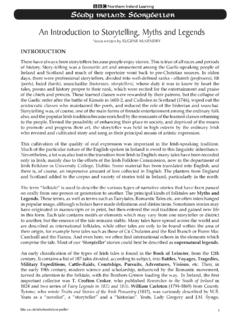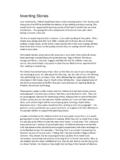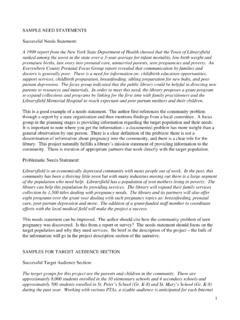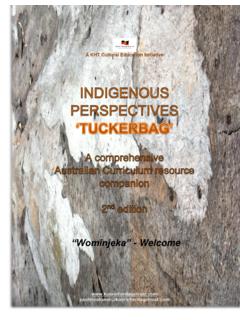Transcription of Special Thanks to - Kansas State Department of …
1 Special Thanks the Kellogg Foundation for its support of the Kansas Coalition for Effective Family Engagement (KCEFE). grant project. KCEFE collaborated with the Kansas State Department of Education (KSDE) and the Kansas Parent Information Resource Center (KPIRC), a project of the Technical Assistance Systems Network (TASN) on the development of this resource. The Kansas State Department of Education does not discriminate on the basis of race, color, national origin, sex, disability, or age in its programs and activities and provides equal access to the Boy Scouts and other designated youth groups. The following person has been designated to handle inquiries regarding the non-discrimination policies: KSDE General Counsel, Office of General Counsel, KSDE, Landon State Office Building, 900 Jackson, Suite 102, Topeka, KS 66612-1212, (785) 296-3201.
2 The Kindergarten Year: Turning School Readiness into School Success Kansas Coalition for Effective Family Engagement Kansas Parent Information Resource Center Kansas State Department of Education May 2016. Dear families of kindergarteners: Congratulations! Your child soon will be old enough to enter kindergarten an exciting time for both you and your child. This booklet will provide an overview of the following important topics, which can assist you in preparations to be made prior to kindergarten entry: Page Kansas Early Learning Standards_____ 4. Kindergarten Entry Information_____ 7. Are children required to go to kindergarten? Attendance once your child is in kindergarten Age requirements Required documents for enrolling in kindergarten The Kindergarten Transition_____ 11.
3 Additional Questions You May Have_____ 15. Checklist for Entering Kindergarten_____ 16. Resources_____ 18. Your local school district can provide further information on your child's specific kindergarten experience. Building a relationship with your child's teacher and school can help enrich your experience and your child's success. Should you need further assistance, such as finding your school district, learning more about State requirements or would like additional family engagement resources, please don't hesitate to contact us: Kansas Coalition Kansas Parent Early Childhood, Special for Effective Information Education and Title Services Family Engagement Resource Center Kansas State Department of Education Kindergarten in Kansas 1.
4 Research shows that children who enter kindergarten with higher skill levels have more success in kindergarten and continue to have success in school on into the primary grades and beyond. 2 Kindergarten in Kansas School readiness begins at birth. Healthy children with involved families and supportive What is communities enter kindergarten ready to succeed. Parents are a child's first teacher. School Every environment is a learning environment that can either help or hinder the skills, Readiness? knowledge and abilities a child gains in his or her first five years of life. Everything a child experiences impacts lifelong learning. School Readiness is the result of the early learning years.
5 Entering kindergarten is a big milestone. Parents worry their child may not be ready but . All children are ready to enter kindergarten when they meet the age requirement five on or before Aug. 31 of their kindergarten year. The Kansas vision for school readiness is represented by the Kansas School Readiness Framework. An essential building block for Funding future achievement and academic success is school readiness. Early childhood Child experiences from birth to Educational System kindergarten entry that ensure Family Environments Supports health and physical well-being, and the development of Community cognitive, communication and social-emotional skills are necessary for school success and Policy have a direct influence on future outcomes.
6 For further information on the Kansas School Readiness Framework, please go to: Kindergarten in Kansas 3. What should children know and be able to do? Kansas The Kansas Early Learning Standards are Early statements describing the skills and knowledge that young children, ages birth Learning through 5, should know and be able to do. This knowledge and ability varies greatly, and Standards children develop at different rates. Your child may have some skills and not others, and this is okay. Parents know what their child can do and can help their child develop new skills. One of the best activities is reading! Reading every day helps children learn about new ideas and activities, learn new words, talk about the pictures and how they relate to the story, make up their own stories, learn front to back and on and on!
7 Singing, chanting and storytelling are all important and fun ways to learn. Children learn best through play. All children want to explore, experiment and practice what they know and understand. As children develop, they experience their world through play, learning to respond thoughtfully and sensitively to their environment. Through music, movement, drama, games and visual arts, children can share themselves and their creativity while at the same time develop a deeper understanding of relationships between objects and people in their world. Learning about their world also includes participating in their family and community through social interaction. Children learn there are ways to behave and that expectations may differ according to the environment (home vs.)
8 Grocery store). 4 Kindergarten in Kansas Understanding the concepts of The following is a list of mathematics and science goes skills typical for children far beyond counting to the entering kindergarten: number 10. Plays short games beginning to end. Mathematics includes recognizing and using patterns to organize objects, solving problems Can put on his/her through comparison of material and ideas and own coat. collecting information from one's environment and world to make decisions. Knows basic safety rules. Scientific inquiry is asking questions and Pays attention to directions. learning how to find answers. Children use play to organize their learning. Children Recognizes numbers, colors compare, notice similarities and differences and most letters.
9 And group or categorize toys and materials. This ability to organize information into Likes to read, sing, tell categories, qualify data and solve problems stories and take turns in helps children learn about time, space, conversation with others. numbers and the physical world around them. They learn to describe and explore relationships among objects, such as patterns or comparison of size (big, little). For more detailed information, the Kansas Early Learning Standards are available on the Kansas State Department of Education (KSDE) website: Kindergarten in Kansas 5. 6 Kindergarten in Kansas Are children required to go to kindergarten? Kindergarten The simple answer no.
10 Kansas law doesn't require children to attend kindergarten. Entry However, most Kansas children do attend kindergarten when they are age eligible. The Information decision to send a child to kindergarten (or not) is made by the parents and there are many different reasons for either decision. This booklet will hopefully provide you, as the decision-maker, with the information you need to make an informed decision that meets your and your child's needs. Attendance once your child is in kindergarten Once your child enters kindergarten, regular attendance is required. Statute KSA. 72-1111 makes parents responsible for requiring a child who has reached the age of 7. and for whom they are responsible to attend school on a continuing basis until the child turns 18 or has received a high school diploma or a General Educational Development credential.





